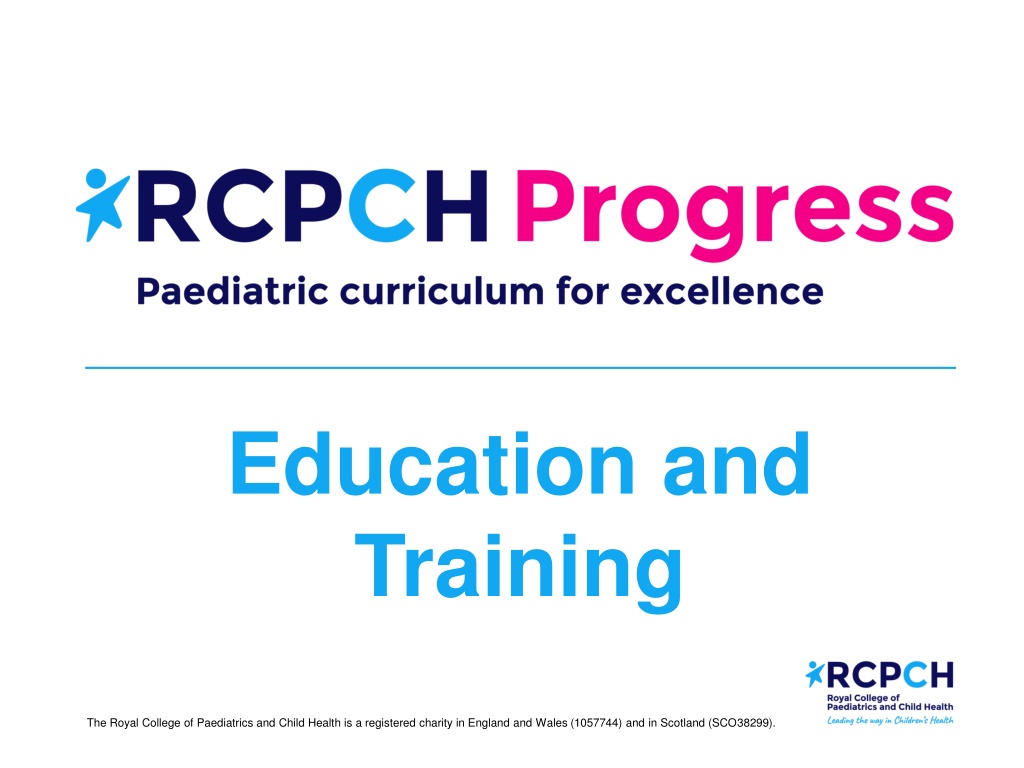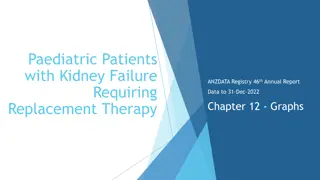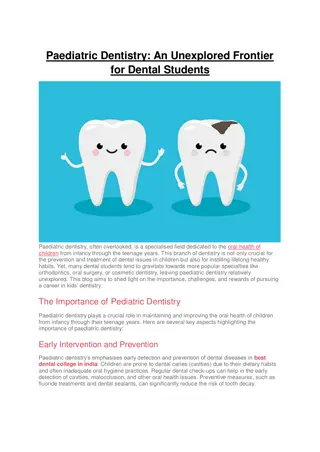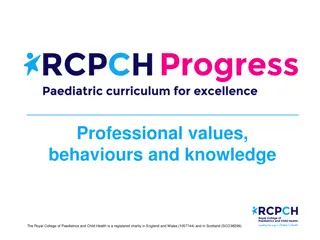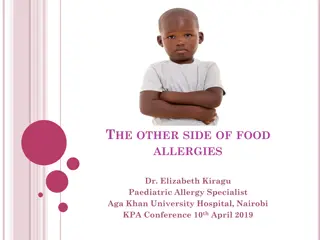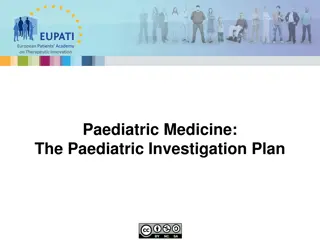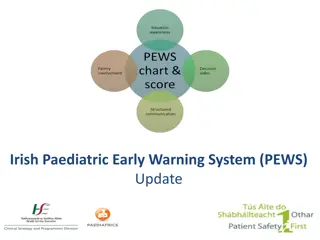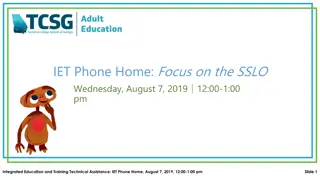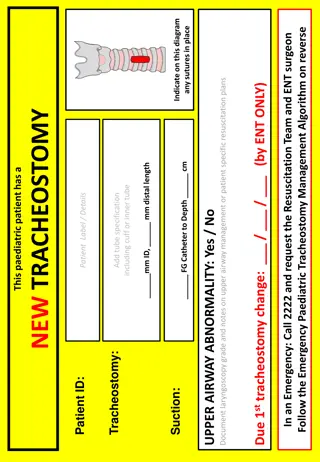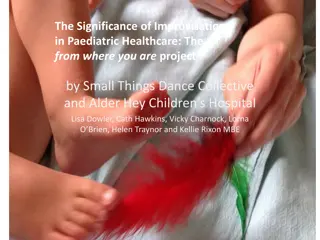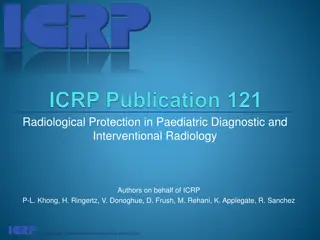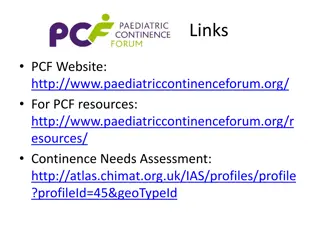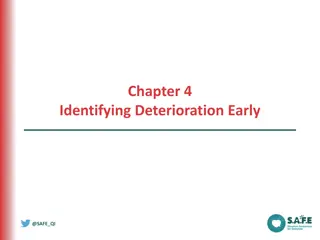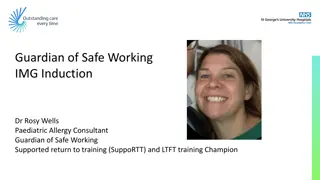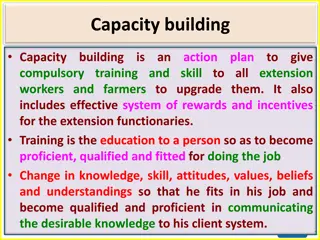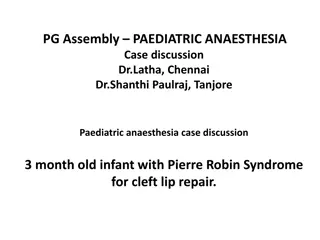Paediatric Training and Education Overview
The Royal College of Paediatrics and Child Health provides structured training and education for healthcare professionals in paediatric settings. The curriculum covers key capabilities at different levels, emphasizing teaching, supervision, assessment, and mentorship. The program focuses on creating effective learning environments, providing feedback, and incorporating Bloom's revised Taxonomy for higher-order thinking skills.
Download Presentation

Please find below an Image/Link to download the presentation.
The content on the website is provided AS IS for your information and personal use only. It may not be sold, licensed, or shared on other websites without obtaining consent from the author. Download presentation by click this link. If you encounter any issues during the download, it is possible that the publisher has removed the file from their server.
E N D
Presentation Transcript
Education and Training The Royal College of Paediatrics and Child Health is a registered charity in England and Wales (1057744) and in Scotland (SCO38299).
Curriculum overview Learning outcome Performs planned teaching and learning events under guidance. Level 1 Plans and delivers teaching and learning experiences to trainees and other professionals. Provides appropriate and constructive feedback Level 2 Models the knowledge, skills and attitudes to provide appropriate teaching, learning opportunities, supervision, assessment and mentorship in the paediatric healthcare setting. Level 3
Curriculum overview Learning outcome Key capabilities Level 1 Performs planned teaching and learning events under guidance. Plans and delivers small group teaching sessions (e.g. case presentation and journal club). Provides evidence of obtaining feedback on teaching delivered and being able to reflect on and learn from this.
Curriculum overview Learning outcome Key capabilities Level 2Plans and delivers teaching and learning experiences to trainees and other professionals. Provides appropriate and constructive feedback Demonstrates the ability to plan and deliver teaching in a range of clinical contexts. Shows the ability to assess the different learning needs, levels of support and supervision required by each member of the team they clinically supervise. Provides appropriate feedback.
Curriculum overview Learning outcome Key capabilities Level 3Models the knowledge, skills and attitudes to provide appropriate teaching, learning opportunities, supervision, assessment and mentorship in the paediatric healthcare setting. Evaluates teaching practice in a range of contexts using a variety of methods. Effectively uses structured learning events (SLEs) to facilitate learning Teaches patients, families, junior colleagues and other healthcare professionals about a range of general paediatric conditions.
Underpinning knowledge Effective learning environments Teaching mentoring and supervision Patient and carer education Education and Training Assessment and feedback
Learning and Teaching (Bloom s revised Taxonomy reproduced) Higher-order thinking Creating Generating new ideas, products, or ways of viewing things Designing, constructing, planning, producing, inventing Evaluating Justifying a decision or course of action Checking, hypothesising, critiquing, experimenting, judging Analysing Breaking information into parts to explore understandings and relationships Comparing, organising, deconstructing, interrogating, finding Applying Using information in another familiar situation Implementing, carrying out, using, executing Understanding Explaining ideas or concepts Interpreting, summarising, paraphrasing, classifying, explaining Remembering Recalling information Recognising, listing, describing, retrieving, naming, finding Over time, a learner moves from lower to higher-order thinking as they gain expertise. This applies to all clinical skills, including education.
Teaching methods Teaching Method Main Process Role of the teacher Principal author (s) Didatic Telling Pass on knowledge Many Socratic Questioning Facilitating learning through awareness Raising questions Neighbour Heuristic Encourage self / discovery learning Promote learner autonomy and self directed learning Kolb Knowles Counselling Explore feelings and assumptions Encourage self awareness / self discovery and reflective practice by using discussion, challenging assumptions and explorations of feelings Sch n
Effective Learning Environment Self-fulfilment needs Self-actualisation Achieving one s full potential, including creative activities Psychological needs Esteem needs: prestige and feeling of accomplishment Belongingness and love needs: intimate relationships, friends basic needs Safety needs: security, safety Psychological needs: food, water, warmth, rest To learn effectively we need a suitable environment. It is the responsibility of the clinical educator to create that space.
Supervision Vision implies seeing Supervision over-seeing, looking over someone s shoulder Super also in sense of outstanding or special, helping someone to extend their professional skills and understanding Halpern and McKimm .B J Hosp Med 2009;70:226-9
Framework for GMC supervision standards http://www.gmc-uk.org/education/standards.asp
Mentoring Mentoring is the process by which an experienced, highly regarded, empathic person (the mentor) guides another individual (the mentee) in the development and re-examination of their own ideas, learning, and personal and professional development. Standing Committee on Postgraduate Medical and Dental Education (1998) Supporting doctors and dentists at work: an enquiry into mentoring ,
A Mentor is A more experienced individual willing to share knowledge with someone less experienced in a relationship of mutual trust" - David Clutterbuck. A trusted counsellor or guide. Normally a senior person to the associate. A coach, motivator, and role model.
Mentoring Skills Trust Openness Understanding Confidentiality Honesty
Whats the difference between a mentor and a supervisor?
Examples from the Curriculum At level 1 The Trainee is asked by their Supervisor to teach at the weekly departmental journal club. They prepare their journal article and some associated teaching materials to share with colleagues. Before the day they are able to discuss the session with their Supervisor. The Supervisor observes the Trainee s teaching and provides feedback using a CBD.
Examples from the Curriculum At level 2 The Ward Sister and the Trainee have been discussing the difficulties of winter in acute paediatrics. This leads the Sister to ask the Trainee to deliver a teaching session on respiratory illnesses in children. The audience will be nursing staff, medical students, allied health professionals and a physicians assistant. The Trainee plans the session and discusses it with their Supervisor. They deliver the session at the agreed time. The Supervisor is able to observe the trainee, and provide feedback following the session.
Examples from the Curriculum At level 3 The Trainee notices that a number of parents on the neonatal unit are anxious about their babies being discharged home soon. The Trainee plans and delivers a session on the neonatal unit for parents, about practical tips for caring for a premature baby, and how to spot an unwell child. Afterwards, the Trainee collects written evaluations from parents about what they liked, and what else they would like to know. The Trainee s supervisor discusses the session with them afterwards and completes a Leader CBD detailing the main points of their discussion.
Learning and assessment Work place based assessments are tools to help facilitate and evidence learning in the work place. Used well, the Kaizen assessments can help provide structure to clinical supervision. Level 2 and 3 Trainees should become proficient at using the assessment tools to provide clear and constructive feedback to peers and colleagues.
Evidencing clinical education Assessments can also be helpful in evaluating and evidencing your own teaching. There is no single Kaizen assessment tool to use for teaching evaluation. If you want a large group of learners to provide an evaluation of your teaching you can collect this separately using a tool specific to your session, and upload it to your e-portfolio. If you want feedback from a supervisor or peer, you could consider: A CEX for directly observed teaching events. A CBD for teaching you have discussed. A Leader CBD for teaching you have designed and lead. Using the Developmental Log to record a face-to-face discussion.
Push yourself Medical education is an area in which trainees regularly make significant contributions to healthcare. These slides briefly address the capabilities all paediatric trainees should aim to be proficient in. Some trainees will want to pursue this role further and take on formal clinical education responsibilities. If you have an interest in medical education, consider a postgraduate medical education qualification, or for practical tips, check out the RCPCH Paediatric Educators Special Interest Group website.
Useful training and resources Mentoring skills courses Effective Educational Supervision courses Paediatric Educators Special Interest Group The Association of Medical Education in Europe Association for the Study of Medical Education Association for Simulated Practice in Healthcare R Ghataoura, V Acharya. Selecting the right postgraduate course in medical education. BMJ 2016; 352 https://doi.org/10.1136/bmj.h6883 RCPCH Progress - Supervisor & Trainee video - https://www.youtube.com/watch?v=_brAqG_KWWA
